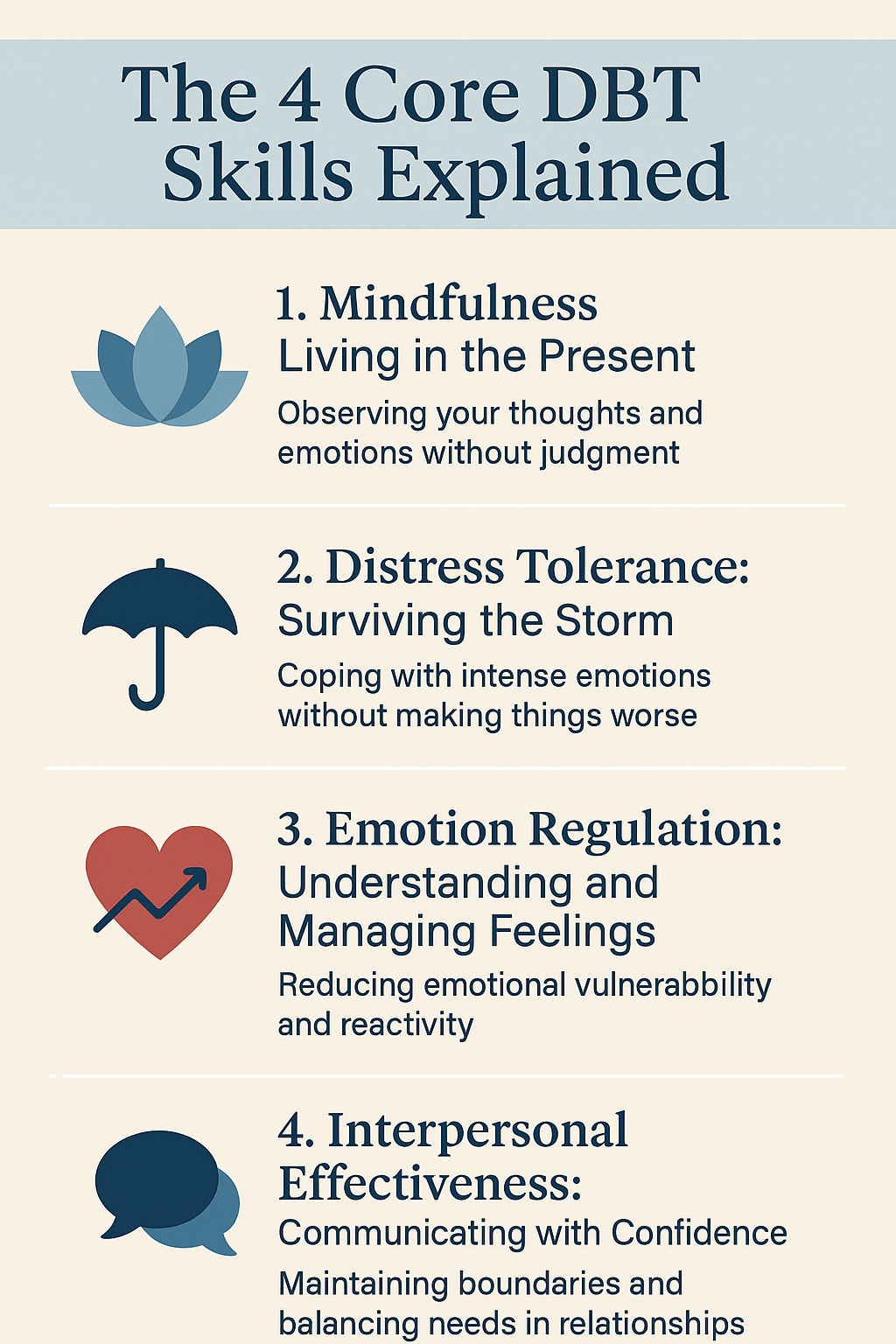DBT 101: What Dialectical Behaviour Therapy Really Looks Like (and Why It Works)
💬 What Is DBT—and Why Is Everyone Talking About It?
If you’ve ever been told to “calm down” when you’re already overwhelmed, you know how unhelpful that feels.
DBT, short for Dialectical Behaviour Therapy, is a type of therapy designed for people who feel emotions deeply—and want real, practical ways to manage them.
Developed by psychologist Dr. Marsha Linehan, DBT was originally created to treat Borderline Personality Disorder (BPD), but it’s now used for a wide range of challenges including anxiety, depression, ADHD, eating disorders, and emotional dysregulation.
At its core, DBT helps you hold two truths at once:
“I’m doing the best I can” and “I can learn to do better.”
This balance—called dialectics—is what makes DBT so powerful. It’s not about suppressing emotions; it’s about learning to navigate them with awareness, acceptance, and skill.
.png)
🧠 The Science Behind DBT: Emotion Regulation in Action
Unlike traditional talk therapy, DBT blends cognitive-behavioural strategies, mindfulness, and acceptance-based techniques to help you build tangible life skills.
Think of it as emotional strength training.
DBT focuses on four key skill areas, each designed to help you handle life’s toughest moments without falling apart—or falling into patterns that hurt you.
🌿 The Four Core DBT Skills (and How They Help)
1. Mindfulness: Living in the Present
Mindfulness is the foundation of DBT. It teaches you to observe your thoughts and emotions without judgment—so instead of reacting automatically, you can respond intentionally.
What it looks like:
- Grounding yourself through breathing or sensory awareness
- Noticing urges without acting on them
- Learning to pause before reacting
Real-life example:
You feel a wave of panic before a big presentation. Instead of spiraling, you take three deep breaths, notice your anxiety, and remind yourself, “This feeling will pass.”
2. Distress Tolerance: Surviving the Storm
These skills are all about getting through painful emotions without making things worse. When life feels unmanageable, distress tolerance helps you cope in the moment.
What it looks like:
- Using self-soothing techniques (music, warmth, movement)
- Distracting yourself temporarily with healthy activities
- Practicing radical acceptance of what you can’t control
Real-life example:
You’re in an argument and want to send a text you’ll regret. Instead, you walk away, put your phone down, and focus on calming your body first.
%20(3).png)
3. Emotion Regulation: Understanding and Managing Feelings
DBT helps you decode your emotional patterns—what triggers them, how your body reacts, and what those feelings are trying to tell you. Once you understand the cycle, you can learn to interrupt it.
What it looks like:
- Naming emotions clearly (“I feel shame,” not just “I feel bad”)
- Building habits that reduce vulnerability (sleep, nutrition, movement)
- Practicing opposite action—doing the healthy thing, even when it’s hard
Real-life example:
You feel rejected and want to isolate. Instead, you reach out to a trusted friend, even though it feels uncomfortable.
4. Interpersonal Effectiveness: Communicating with Confidence
If relationships often feel overwhelming—too much, too little, or just plain complicated—this skill set helps you express yourself clearly while respecting your own boundaries and others’.
What it looks like:
- Using assertive communication
- Learning to say no without guilt
- Balancing self-respect with connection
Real-life example:
You need to tell your partner you’re upset about something. Instead of shutting down or lashing out, you use “I” statements and share how you feel calmly.
🔄 How DBT Works in Practice

At KMA Therapy, our DBT-informed sessions are collaborative, compassionate, and deeply practical. You’ll typically work through DBT skills in one of two settings:
🧍♀️ Individual DBT Therapy
One-on-one sessions with your therapist help you identify triggers, track emotions, and apply DBT tools to your real life. Your therapist becomes your guide, helping you build confidence in using your new skills outside of sessions.
👥 DBT Group Therapy
Our Toronto-based DBT group offers a supportive, structured environment where you can learn and practice skills with others who “get it.” You’ll discover that you’re not alone—and learn from peers who are also growing emotionally.
Group therapy can feel intimidating at first, but clients often say it becomes the highlight of their week. It’s a safe, judgment-free space to practice mindfulness, share experiences, and build resilience together.
🌇 Why DBT Works So Well for Toronto Clients
DBT resonates deeply with people who lead high-stress, high-achieving lives—especially here in Toronto, where constant busyness and pressure can mask emotional exhaustion.
Our clients often say things like:
“I feel like I’m always ‘on.’”
“I have so many tools, but I still can’t regulate my emotions.”
“I just want to stop feeling so reactive all the time.”
DBT provides a framework for slowing down, understanding what’s happening internally, and building confidence in your ability to handle whatever comes your way.
❤️ A Therapist’s Note: Growth Takes Practice, Not Perfection
DBT isn’t about being “zen” all the time—it’s about learning to meet yourself where you are. You’ll make mistakes, you’ll forget to use your tools, and that’s okay. What matters is your willingness to come back, again and again, to the skills that support your healing.
At KMA Therapy, our DBT-trained therapists will help you understand not just what you feel, but why—and how to navigate it with more calm, control, and self-compassion.
%20(2).png)
💛 Ready to Try DBT for Yourself?
You don’t have to manage big emotions alone.
Whether you’re interested in individual DBT sessions or joining our Toronto DBT group, we’ll help you find the right fit.
👉 Book Your Free 15-Minute Discovery Call
Let’s build your emotional toolkit—togethe






